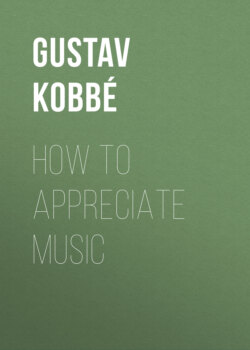Читать книгу How to Appreciate Music - Gustav Kobbé - Страница 27
На сайте Литреса книга снята с продажи.
Bach and the Weather Bureau.
ОглавлениеThis digression, which I have made in order to discuss the difference between music as a science and music as an art, a distinction which, I have pointed out, often is so marked that a person may be thoroughly equipped on the scientific side of music without being sensitive to its beauty as an art, seemed to me necessary at this stage. I am reminded by it of the distinction which Edmund Clarence Stedman, in his “Nature and Elements of Poetry,” so wittily draws between the indications of a storm as described by a poet and by the official prognostications of the Weather Bureau. Mr. Stedman quotes two stanzas:
| “When descends on the Atlantic the gigantic Storm-wind of the Equinox, Landward in his wrath he scourges the toiling surges, Laden with seaweed from the rocks.” |
And this stanza by a later balladist:
65
| “The East Wind gathered, all unknown, A thick sea-cloud his course before; He left by night the frozen zone, And smote the cliffs of Labrador; He lashed the coasts on either hand, And betwixt the Cape and Newfoundland, Into the bay his armies pour.” |
All this impersonation and fancy is translated by the Weather Bureau into something like the following:
“An area of extreme low pressure is rapidly moving up the Atlantic Coast, with wind and rain. Storm-center now off Charleston, S. C. Wind N. E.; velocity, 54. Barometer, 29.6. The disturbance will reach New York on Wednesday, and proceed eastward to the Banks and Bay of St. Lawrence. Danger signals ordered for all North Atlantic ports.”
Far be it from me to imply that contrapuntal music in general or Bach in particular represents the Weather Bureau. None the less is it true that Bach appeals more strongly to the scientific musician than to the music-lover who seeks in music a secondary meaning—love, passion, grief; the mood awakened by the contemplation of a forest landscape with its murmuring foliage, a boundless prairie, or the unquiet sea.
The technical indebtedness of modern music to Bach is so immense, and the artistic probity of the man himself was so wonderful, for he worked calmly on, in spite of what was worse than opposition—neglect—that I think the tendency on the part of Bach enthusiasts, 66 while not overrating the importance of the influence he has had during the past fifty years or more, is to underrate others as compared with him. When critics declare that one virtuoso or another is not a great Bach player, are they not ignoring what is a simple fact—that no player can make the same appeal through Bach that it is possible for him to make through modern music, and that, as a rule, when a virtuoso, however good a musician he may be, places Bach on his program, he does so not from predilection, but as a tribute to one of the greatest names in musical history? It seems to me that the extreme Bach enthusiasts can be divided into two classes—musicians who are able to appreciate what he did for music on its technical side, and people who want to create the impression that they know more than they really do.
